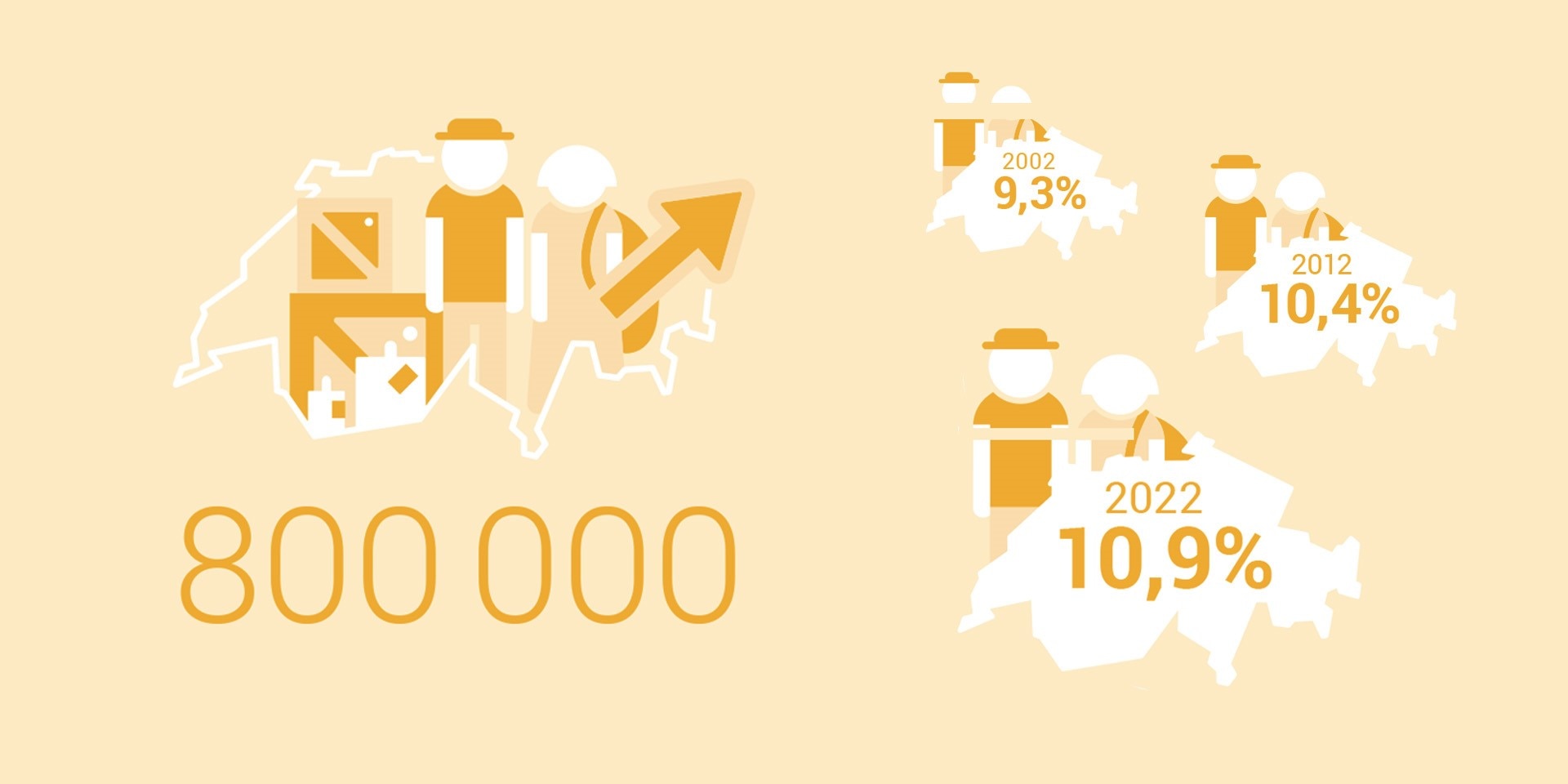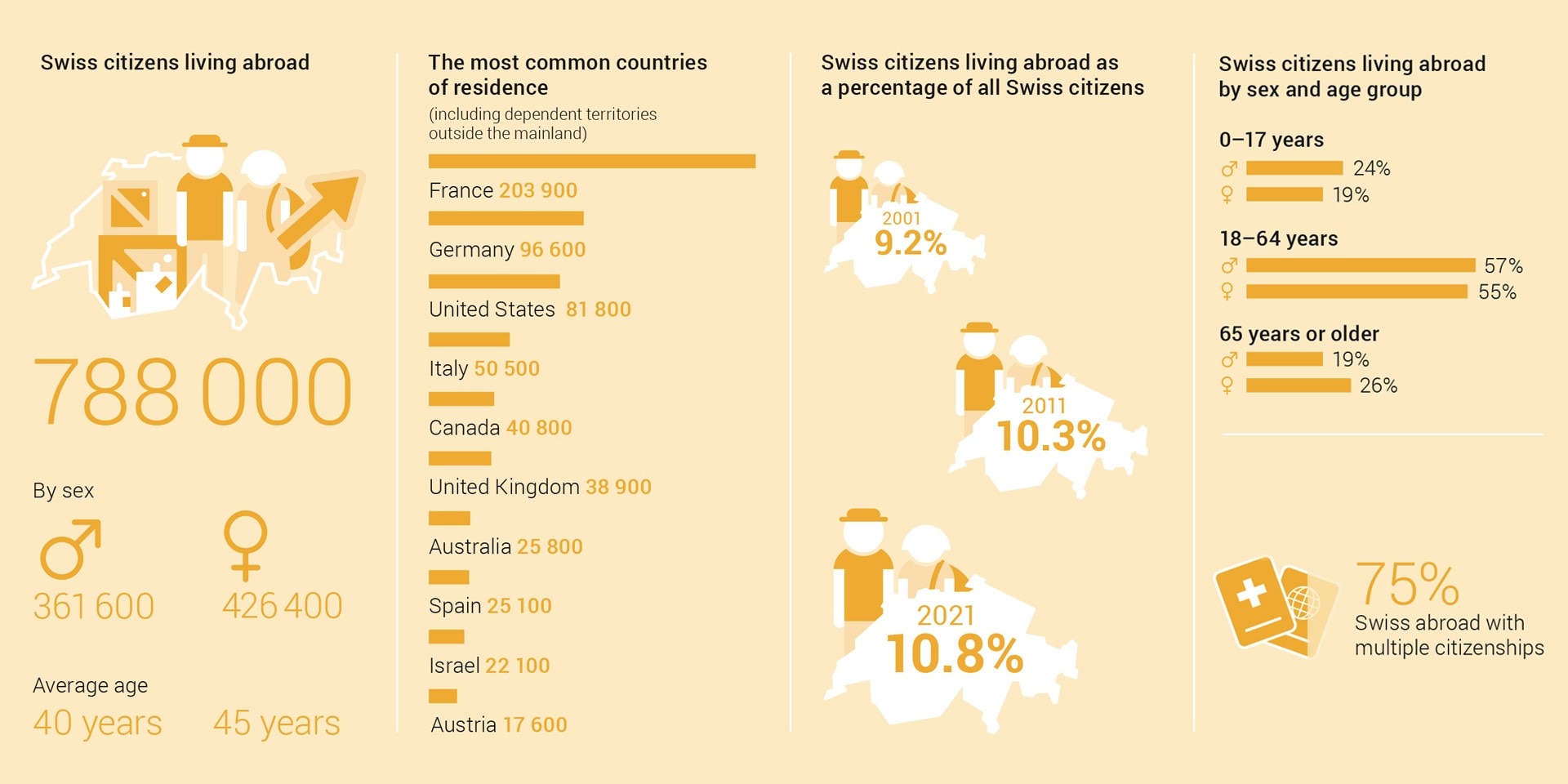Number of Swiss nationals living abroad passes 800,000 mark, according to FSO
The number of Swiss nationals living abroad has passed the 800,000 mark. The number of Swiss nationals living abroad continued to grow in 2022, but fewer and fewer are choosing to live in Central or Southern Africa. Gianni Zezza, 66, is among those with a strong personal stake in the region. Like many Swiss people, he decided to emigrate and settle down in another country.

The number of Swiss nationals living abroad has passed the 800,000 mark. © FDFA © FDFA
Over the past 30 years, more and more Swiss nationals have decided to emigrate abroad. Their reasons for emigrating vary: some want to reconnect with their origins, some are in search of professional opportunities, and others want to start a new life abroad. Gianni Zezza was a young man when he realised that he wanted to emigrate.
The son of Italian immigrants, he was born in Sion in 1956, spent his childhood and teenage years in the canton of Valais, and became a naturalised Swiss citizen in the late 1970s. Although he identified with Switzerland and its values, he also longed to experience the world beyond. "Teenagers are impressionable, which can be a good thing," Zezza explains over the phone from his home on Bubaque, one of the Bijagós islands off the coast of Guinea-Bissau. "My best friend in the village where I grew up near Sion was from Senegal. He taught me a lot about Senegalese culture. So I was drawn to Africa from an early age.
In 1989, at the age of 33, Zezza decided to leave Switzerland to join his friend in Kafountine, a village in the Basse-Casamance region of southern Senegal. He discovered a country full of opportunities, where he was able to realise his own projects and contribute to the betterment Senegal. In 2011, he decided to head further south and settled on an island off the Atlantic coast of Guinea-Bissau. He built a three-room guest house with a bar and restaurant, a short canoe ride from the capital, Bissau. A keen fisherman, Zezza has settled into a contented rhythm of life over the past twelve years.
Majority of Swiss abroad with dual nationality
Nearly 75% of Swiss abroad have dual or multiple citizenships. Some also become naturalised citizens of their adopted country. A dual citizen of Italy and Switzerland, Zezza considered applying to become a citizen of Guinea-Bissau. In the end he decided not to because he realised that it would be more trouble than it was worth. "In some countries, having more than two passports is complicated. To avoid bureaucratic hassles, I decided to keep my residence permit in Guinea-Bissau, which is valid for five years." Zezza also registered with the Swiss embassy in Dakar, which covers Guinea-Bissau, and is therefore included in the statistics on the Swiss abroad.
Like many Swiss emigrants before him, Zezza has fully integrated into the countries he has lived in, and has learned two additional languages since he moved to Africa 30 years ago. In Senegal he learned to speak Wolof, the country's most widely spoken language, and he now also speaks Kiriol, the Portuguese-based creole spoken in Guinea-Bissau. "Learning the local language is the best way to really get to know the country you're living in. The lifestyle of the people here in Bissau quickly becomes second nature."
Steady rise in number of Swiss abroad
Gianni's Zezza story provides insights into the diverse and complex factors that lead Swiss citizens to emigrate abroad each year. The number of Swiss nationals living abroad has continued to rise over the past 20 years. Just over 800,000 Swiss nationals are currently registered with a Swiss representation abroad. This trend is amplified by the growing number of children outside Switzerland who acquire Swiss nationality at birth.
Like Zezza, most of them want to maintain strong ties with Switzerland. Switzerland will always be the country of his childhood memories, but he has no plans to return anytime soon. Living in nature has taught me to grow my own produce, catch my own fish and embrace organic farming. After living in Africa for decades, returning to Switzerland feels like a remote possibility."
Statistics bear this out: net migration of Swiss nationals has been negative since 1992. In concrete terms, this means that the proportion of Swiss nationals leaving the country has consistently been higher than the number returning. I don't like to travel," says Zezza. "I don't pack my bags and leave because I want to travel, but because I want to experience a different way of life."
The number of Swiss nationals registered with representations in Central and Southern Africa has declined since 2002
Compared to 2021, the number of Swiss abroad has increased on all continents, including Africa (+0.4%). About 2% of Swiss nationals living abroad are registered on the African continent. The most significant increases in Africa are in North Africa, particularly in Algeria and Morocco. In other parts of Africa, however, the number of Swiss nationals has declined over the past 20 years. This is particularly the case in Central and Southern Africa. In Central Africa, where Guinea-Bissau is located, the number of Swiss nationals has dropped by as much as 24%.
Three Swiss men and one Swiss woman were living in Guinea-Bissau in 2022. Only one of them was only a citizen of Switzerland. Guinea-Bissau is one of 29 territories – mostly Atlantic and Pacific islands – with fewer than 10 Swiss residents.
The FDFA's Consular Directorate continues to serve the Swiss abroad
The Consular Directorate (KD) of the FDFA provides a variety of services for Swiss nationals living around the world.
The KD works closely with other federal agencies, cantonal bodies, foreign authorities and other national and international partners. It is responsible for coordinating all matters relating to the Swiss abroad within the Federal Administration.



